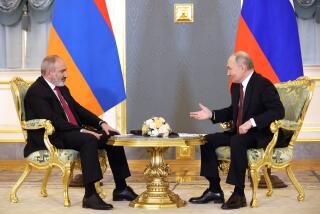Tieless Yeltsin, Hashimoto Talk Ties
- Share via
KAWANA, Japan — Escaping from their respective domestic political woes, Russian President Boris N. Yeltsin and Japanese Prime Minister Ryutaro Hashimoto on Saturday began a 24-hour “no necktie” summit at this Japanese seaside resort, where they agreed to pursue more economic cooperation between the long-estranged neighbors.
Looking robust and alert despite a winter of illnesses and a nearly 10-hour flight from Moscow, the 67-year-old Yeltsin had a 92-minute meeting with Hashimoto to discuss such issues as the use of Japanese technology to curb energy-guzzling Russia’s greenhouse gas emissions, joint space exploration and swift disbursement of $1.5 billion in development loans for Russia.
At a joint news conference this morning, Yeltsin said that Hashimoto had made a “serious and interesting” proposal on resolving their thorny territorial dispute over four northern islands seized by the Soviet Union at the end of World War II, an issue that has for 53 years prevented Japan and Russia from signing a formal peace treaty.
Hashimoto declined to make the proposal public until Yeltsin and the Russian government study it. Yeltsin said he had no immediate response but would give the plan serious consideration. He added, though, “In our personal relationship, we already have a peace treaty.”
No breakthrough had been expected. With Hashimoto under fire at home and abroad for his handling of the wilting Japanese economy, and with Yeltsin in a fierce battle with the Russian parliament over his choice for prime minister, neither leader is well positioned to make unpopular concessions on an issue that arouses fierce nationalist sentiment in both countries.
Ignoring such troubles, the two besieged politicians instead made a double-cameo appearance at a Japanese wedding being held at their summit hotel, listened to traditional drummers and went fishing together. Yeltsin also gave Hashimoto files documenting KGB interrogations of Japanese generals captured by the Soviet army during World War II.
In a historic summit last November in the Siberian city of Krasnoyarsk, Yeltsin and Hashimoto agreed to seek a Russo-Japanese peace treaty by 2000, and low-key negotiations are proceeding. But Saturday’s meeting focused on practical measures aimed at generating the mutual trust, goodwill and interdependence that could eventually make such a political settlement possible.
“It is practically impossible to have a resolution of the political problem without a change in public opinion,” Russian First Deputy Prime Minister Boris Y. Nemtsov told reporters after emerging from the meeting. “The question is how to bring closer the positions of the peoples of the two countries, and the only way is through intensive cultural and economic contacts.”
According to a Japanese spokesman, the two sides agreed that:
* Japan will conduct feasibility studies on 20 projects proposed by firms that want to use Japanese technology to reduce Russia’s greenhouse gas emissions. Under the global warming agreement struck in Kyoto, Japan, in December, Japan will be permitted to include emissions cuts obtained in Russia in its emissions-reduction quota.
* The two nations will conduct joint space exploration and research on space medicine. A first meeting on space cooperation was held in Tokyo earlier this month.
* Japan, through its Export-Import Bank, will extend Russia $1.5 billion in loans over two years, to be used for whatever purpose Moscow sees fit. Hashimoto said Japan is preparing to disburse the first $600 million.
In addition, Yeltsin invited Hashimoto to visit Moscow this autumn and said he would like to come to Tokyo in 1999 as part of the “energetic and intensifying” dialogue between the former Cold War enemies, the spokesman said.
Japan is involved in two international consortiums for oil drilling off Sakhalin Island, north of the disputed islands, and more energy projects in Siberia and the Russian Far East are under discussion.
Tokyo has also promised to help upgrade the renowned Trans-Siberian Railroad, and Russia has agreed on a deal to allow Japanese fishermen to work in the disputed island waters.
Yeltsin proposed joint construction of a fish processing plant on one of the disputed islands--known in Russia as the South Kurils and in Japan as the Northern Territories--but Hashimoto said that issue will have to be discussed in parallel with the territorial issues, the spokesman said, meaning that progress could be slow.
Most Russian politicians remain stridently opposed to any ceding of the rocky, impoverished islands to Japan, and the Japanese government has shown no public willingness to drop its demand that the islands be returned to Japan.
But one Russian delegate to the peace talks hinted last week that “joint management” of the disputed islands might be the most logical approach to removing the single biggest obstacle to drafting a treaty.
However, acting Prime Minister Sergei V. Kiriyenko sought Friday to assure Communist and nationalist deputies in the Duma, the lower house of Russia’s parliament, that Russia has no intention of surrendering the islands. “Nobody is planning to give away anything,” he said.
Japanese ultranationalists have for years been stridently demanding the return of the four islands to Japan, bombarding the Russian Embassy almost daily with tirades delivered at ear-splitting volume from their flag-draped sound trucks.
The Japanese mobilized a 5,000-member security force to prevent the nationalists from disrupting the summit, but there were demonstrations in Tokyo and Kawana, where three protesters were arrested.
However, Yeltsin was given a warm welcome by the schoolchildren of Kawana, 75 miles southeast of Tokyo, and local restaurants sold “Welcome Yeltsin” beer and Russian bread and pastries.
Efron reported from Kawana and Williams from Moscow.
More to Read
Sign up for Essential California
The most important California stories and recommendations in your inbox every morning.
You may occasionally receive promotional content from the Los Angeles Times.














